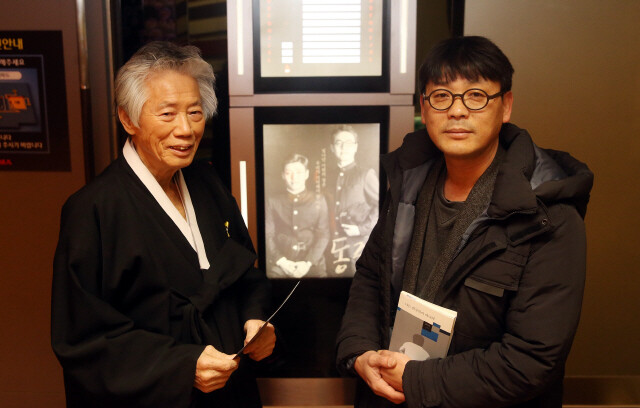Poems and movie scripts published directly on stage
From Jiha Kim and Minki Kim to Inkwon Jeon and Kyungdong Song
Culture artists follow him and get inspired and stimulated

In February 2016, a film by Paik Ki-wan (left) and poet Song Gyeong-dong <동주>And took a commemorative photo. By Shin So-young, staff reporter [email protected]
It is widely known that Paik Ki-wan is a lyricist for the folk song’The March for Being’. This song was inserted into a song for the soul wedding ceremony of the militia spokesman Yoon Sang-won and ‘Deulbulyahak’ colleague Park Ki-soon in 1981, the year after the May 18 Gwangju Uprising. It was composed by Kim Jong-ryul and novelist Hwang Seok-young made Paik’s long poem’Moonbinari -A part of’floating on a young South Korean dancer’ was modified and written as lyrics. The original work appears in the first collection of poetry Paik published in 1982, not for sale. In addition, Paik Ki-wan published a collection of prose that is the same as a collection of poems and old storybooks, and in 2009, he published a book of prose autographs through serialization. He dreamed of becoming a soccer player when he was young and a film director when he was young. He also published the same screenplay as a book. During his lifetime, around Paik Ki-wan, cultural artists and cultural activists gathered along with unification and labor activists. Artists such as Kim Ji-ha, a poet who led the Seoul National University cultural movement in the 1960s and 1970s, art historian Yoo Hong-jun, dancer Lee Ae-ju, singer Im Jin-taek, singer Kim Min-ki, painter Shin Hak-cheol, singer Jeong Tae-chun, and Jeon In-kwon, recently followed him. These artists, spanning almost all fields of culture, including literature, met Paik and listened to his stories to get inspiration and inspiration. The reason why cultural artists gathered around him was that the peculiar ethnic aesthetic he preached was attractive. He had his own aesthetics, whether it was about aesthetics in general or each genre of art, and the core of it was that it should be an art that leads social transformation in a style unique to Joseon. It is also well known that Paik’s song marks the beginning of Hwang Seok-young’s big story and symbolizes the theme of this work. In 2014, at the 40th anniversary of the founding of the Korean Writers Association, he was regarded as a’writer’s friend’ and received a plaque of appreciation. Baek Ki-Wan, who tried to open a story yard close to the performance with stories, songs, yells, and tears from private seats, arranged several official stage performances with poems, songs, and stories. ‘Malim’ (2007), where you tell your own story novel with your whole body in a small theater,’Baek Ki-Wan’s Life Story related to Song’ performance (2009), where you directly recall your life related to passing popular songs (2009), and 2013 ‘Baek Ki-wan’s Poetry Recitation Night’, etc. are representative. What is indispensable for the achievement and contribution of’Cultural Person Baek Ki-wan’ is his extreme love in Korean. He is also famous for refraining from foreign vocabulary such as Chinese, English, and Japanese in his usual words and writings and for using pure Korean language. The teacher was the first to make and write words such as a village, a newbie, a club, and a mokoji. The books he wrote are full of pretty pure Korean words such as Landbyul (Earth), Hansalmae (Life), Bae Hae (Student), Deuteronomy (nickname), Saemom (News), Dear (Moon), Nulde (Room). Among them, there are some that he has learned from adults since he was a child, but there are not a few things he made by himself. On February 22, 2016, Paik Ki-wan watched the movie with his beloved junior poet Song Gyeong-dong. Poet Song Gyeong-dong said to him that he wanted to make the story of Yun Dong-ju and Song Mong-gyu into a movie first if he became a movie director. “At the end of the movie, I particularly liked the scene where Yun Dong-joo looked at the stars in the night sky outside the bar. I don’t think I can forget those stars I saw with my teacher. I thought that one day I will come when I miss you like that star, so even watching the movie, my heart got complicated and tears came out.” Five years later, Baek Ki-wan became a star in the night sky, and the rest of them look at the stars and miss the teacher in their lifetime. Senior Reporter Choi Jae-bong [email protected]
